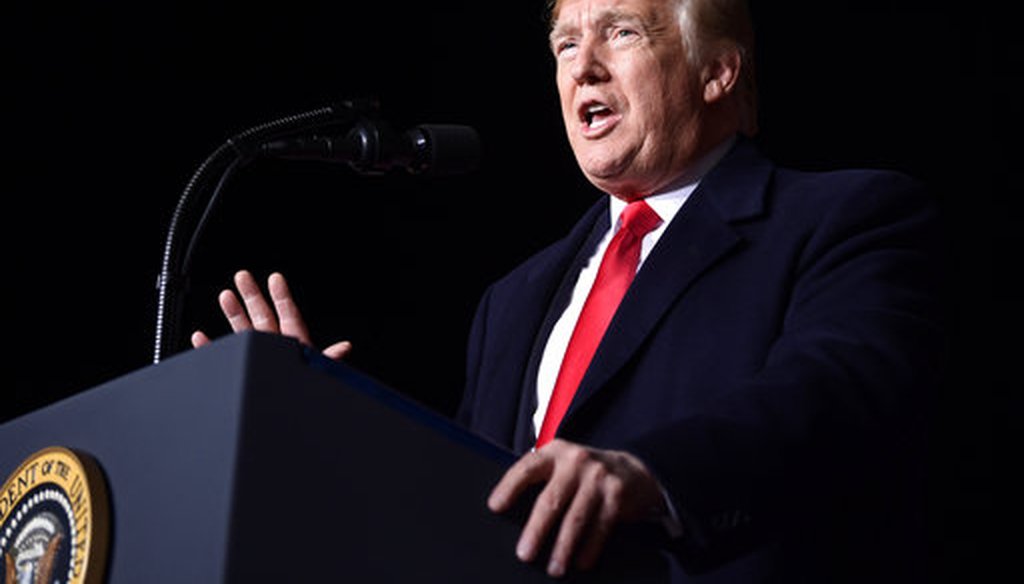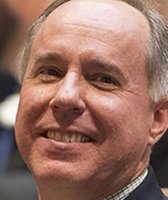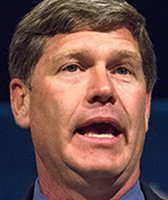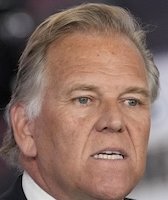Get PolitiFact in your inbox.

President Donald Trump speaks at a rally at Central Wisconsin Airport in Mosinee, Wis., Oct. 24, 2018. (AP/Susan Walsh)
If there’s one thing President Donald Trump wants Wisconsinites to take away from his Milwaukee rally on Tuesday, it’s that he delivers on his word.
As the 2020 campaign ramps up, there’s no doubt Trump will emphasize fulfillment of his 2016 promises, whether it’s appointing conservative judges to the Supreme Court or working to defund Planned Parenthood.
PolitiFact’s Trump-O-Meter has been tracking progress of 102 promises Trump made on the campaign trail. The national staff has rated 17 pledges "Promise Kept," meaning the president has fulfilled what he pledged. Eleven were rated "Compromise," meaning Trump achieved partial success on the promise.
Overall that means about 27% of Trump’s promises were kept or partially kept during his first three years in office.
Another 28 promises, or 27%, have been rated "In the Works," which means they are in the process of potential fulfillment, but it’s too early to tell the outcome.
Sign up for PolitiFact texts
Another 28 have been marked "Stalled," meaning no significant action has been achieved in the promise, while 18 pledges have been rated "Promise Broken." This means about 45% of Trump’s promises have either been broken or face significant barriers to achievement.
In anticipation of Trump’s visit, and its "Promises Made, Promises Kept" theme, we went back and looked at some of the president’s most significant promises to see where they stand.
The most memorable campaign promise made by Trump likely was his pledge to construct a wall along the southern border and make Mexico pay for it as a means to restrict illegal border crossings of people and drugs.
While chants of "Build the wall" are still an audience favorite at rallies and Trump remains committed to putting up a wall on the border, so far he hasn’t been able to get the money to pay for it. (Mexico has also refused to foot the bill.)
A dispute over funding the wall sent the federal government into a partial government shutdown in early 2019 when Trump refused to sign any spending bill that did not include $5.7 billion to build the wall. Democrats in Congress were unwilling to vote for a bill that would provide money for the wall.
Though Trump’s stepped up border security under his administration, only about 80 miles of border fencing has been completed. That does not represent new portions of a wall as much as replacing smaller existing barriers along the border.
This promise has been rated Stalled.
Establish a ban on Muslims entering the U.S.
A controversial promise made by Trump was to call for a "total and complete shutdown" of Muslims entering the United States.
Shortly after taking office, Trump signed an executive order temporarily suspending immigration from seven Muslim-majority countries and halted the U.S. refugee program. Courts, however, blocked the order after states sued on the claim that it violated constitutional religious liberties.
After Trump’s team revised the order a couple times in an effort to address legal questions, the U.S. Supreme Court upheld the third version of the travel ban in a 5-4 decision. That version restricted entry of nationals from Iran, Libya, Somalia, Syria, Yemen, North Korea and Venezuela.
The Trump administration argued the ban was not based on any religious identity, but for national security concerns.
While Trump’s executive orders have certainly curtailed Muslims seeking entry into the U.S., it only restricts entry of those from five Muslim-majority nations.
That is not a "total and complete shutdown" as he said. This promise has been rated Broken.
Even before he took office, Trump had lofty goals for the economy.
One in particular was to grow the nation’s gross domestic product -- the leading measure of the country’s economy -- from 1% to 4%, even suggesting he could bring it up higher if he wanted.
PolitiFact National found that during Trump’s first year of presidency in 2017, the GDP grew 2.3% -- an improvement from 1.5% the previous year, but short of Trump’s pledge.
The second quarter of 2018 showed a 4.1% real GDP growth, compared to 2.2% in the year’s first quarter.
The growth was based on increases in consumer spending and confidence, exports, business investments and government spending.
For the year, 2018 finished with a growth rate of 2.9%, the strongest since 2015.
The first quarter of 2019 showed a 3% growth in GDP while the second and third quarters slowed to about 2%. Numbers for the fourth quarter have not yet been released.
Economists and analysts remain skeptical that Trump will be able to reach his 4% target, but the president says as more trade deals become established, the country can expect to see higher growth numbers.
PolitiFact will continue monitoring annual economic growth under Trump, but for now, the promise has been rated In the Works.
Cancel the Paris climate agreement
Trump pledged to pull the U.S. out of the Paris climate agreement, an international accord negotiated by 200 countries to try and reduce greenhouse gas emissions to curb climate change.
Trump announced the U.S. would pull out of the agreement in 2017.
While experts agreed it could take anywhere from a year to four years to fully remove the U.S. from the agreement, steps have been implemented to make it a reality.
Last fall, the Trump administration formally notified the United Nations of the U.S. withdrawal from the agreement. The withdrawal is expected to be complete by fall of 2020, after a one-year waiting period has elapsed.
This pledge has been rated Promise Kept.
Health care remains a divisive issue among Americans and public sentiment over the Affordable Care Act, more commonly known as Obamacare, is at the heart of it.
Trump, a strong opponent to Obamacare, promised he would repeal and replace the signature health law of Barack Obama’s presidency.
It didn’t even take two days in office before Trump signed an executive order to instruct administration officials to "to waive, defer, grant exemptions from, or delay" implementing parts of the ACA while Congress prepared to repeal and replace it.
But, due to the late-Sen. John McCain’s nay vote on getting rid of the ACA, Trump had to find other ways to eliminate the law.
Overall, it hasn’t been an easy journey.
So far, the Trump administration has managed to eliminate the ACA’s individual mandate, which required all U.S. residents to have health insurance or pay a penalty.
The administration has also pushed back on the ACA’s efforts to expand Medicaid, making it harder for people to become eligible for payments without proof that they attend school or are working.
Additionally, the Trump administration stopped paying subsidies to insurers in order to motivate them to stay in the ACA insurance exchanges in order to keep premiums down.
They’ve also cut federal funding for programs that help people navigate and figure out specifics to new federally run insurance exchanges and sign up for coverage.
Finally, Trump also extended the length of short-term health plans sold on HealthCare.gov. The Obama administration limited short-term insurance policies that didn’t provide certain essential benefits for patients to a maximum of three months. Under Trump, they can last nearly a year and be renewable for three years.
With Democrats now in control of the House, it’s unlikely any major revisions to Obamacare will be made.
This promise has been rated Stalled.
Move the U.S. Embassy in Tel Aviv to Jerusalem
We’ve heard this one before.
Declaring Jerusalem the capital of Israel and moving the U.S. embassy in the country from Tel Aviv to Jerusalem was a promise made by several presidents before Trump, Democrats and Republicans alike.
In May of 2018, the Trump administration unveiled an interim embassy in a U.S. consular building in Jerusalem.
Though the majority of diplomats are still working in Tel Aviv until a larger space is found, a few staffers including U.S. Ambassador to Israel David Friedman have made the move.
The embassy move met praise from Israeli and U.S. officials, including Senate Minority Leader Chuck Schumer.
However, Palestinians and European allies of the U.S. raised concerns about the move declaring it as a backtrack for a potential peace deal in the region.
We rate this pledge Promise Kept.
Our Sources
PolitiFact, Tracking Trump’s Campaign Promises
PolitiFact, Donald Trump’s promise of 4% economic growth a year did not happen in 2017, Aug. 7, 2018
PolitiFact, Move U.S. Embassy in Tel Aviv to Jerusalem, May 14, 2018
PolitiFact, Trump’s travel restrictions survive Supreme Court, fall short of promised Muslim ban, Nov. 14, 2018
PolitiFact, Long odds against repeal with Democrats running the House, Jan. 7, 2019
NPR, Trump is trying hard to thwart Obamacare. How’s that going?, Oct. 14, 2019
PolitiFact, Donald Trump stalls on promise to build a wall, have Mexico pay for it, Jan. 14, 2019
U.S. Department of State, On the U.S. Withdrawal of the Paris Agreement. Nov. 4, 2019
NPR, U.S. formally begins to leave the Paris Climate Agreement, Nov. 4, 2019
Independent Journal Review, Here are all the presidents who promised to move the U.S. Embassy to Jerusalem but never did
















































